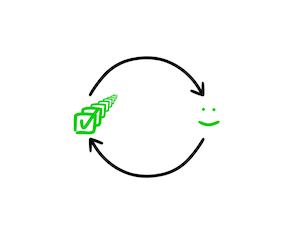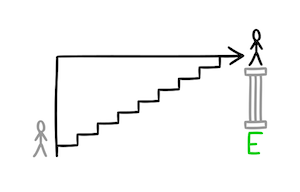Fear of infinite work
What do you imagine when you hear work or studying?
Do you imagine a calm, productive session where you do what’s on your to-do list?
Do you think about how you’ll spend the afternoon with friends afterwards?
Or do you imagine yourself sitting alone at your desk, angry, depressed or stressed?
Do you think about how you’ll have no time for fun until your work is done?
For many of us, work is connected with loneliness, stress, effort, and other negative emotions. No wonder we don’t want to do it! Every task turns into slaying a hungry dragon.
Family or friends who repeat how life and work are hard, how they work from sunrise to sunset, and how poorly their boss treats them can create a very negative image of what work means.
There’s a better way.
Work ahead
Imagine you live to be a 100 years old. And imagine that every day until you retire you wake up and think.
“I have to work again today. When will it end? Why’s the world so unfair?”
Every morning for decades.
That’s not very inspiring, is it? But unfortunately, it’s reality for many people.
What if we could change our feelings towards work?
What if it would mean calm, productive sessions of focused effort? What if we didn’t feel guilty about resting or being with friends because we haven’t done enough work?
First, let’s take a look at what work and fun mean.
Work = drudgery = bad mood

Work or studying mean you, alone at your desk, doing boring things, reading boring materials, and not doing anything fun at all.
Work is spreadsheets and documents, textbooks and exercise, presentations and speeches.
Work is something you have to do or are even forced to do.
Fun = bliss = YOLO

Fun is parties and interesting people.
Fun is sipping wine or beer with buddies.
Fun is online games.
Fun is social media and new notifications (look 5 likes!).
Fun is awesome. YOLO!
Who would want to sacrifice all fun?
If this describes at least in part how you view work and fun, it’s no surprise that you procrastinate.
The thing is that we’re probably at some point have to do something we don’t want to. However, that doesn’t mean we have to drudge our way to retirement.
We can learn to do with calm both what we want to do and what we don’t want to do.
Reward at the end of the world
What do these things:
- A long presentation
- 40 pages of lecture notes
- A full inbox of emails
have in common?

The reward is at the very end.
It can take days, weeks, months, or even years to finally be done.
That’s a lot of time when we aren’t done and won’t be for a while.
No wonder we don’t want to work on projects that will take what feels like 1000 years of work.
How could we make this process better?
Grandma’s rule: first work, then reward
The key to a positive attitude towards work is this simple rule:First work, then reward.
 Who would want to work if it meant the end of all fun? Almost no one.
Who would want to work if it meant the end of all fun? Almost no one.
But it often feels like that’s the case for procrastinators, so their timeline looks something like this:

But when we use the Grandma’s rule, our brain begins to associate work with something pleasurable (reward).
A timeline might hen look more like this:

Doesn’t that look much better?
10 min activity: how will you reward yourself?
Make a short list of things you need to do today (the middle column in the table below).
Then in the right column write how you’re going to reward yourself for completing them.
In the left column, write when you’d like to start on a particular task.
In this way, your brain begins to associate work with fun rewards.
Set a timer for 10 min, take a piece of paper (or a text editor) and go!
Enjoy your reward
Imagine that you got some things done today. But you have this feeling that it just wasn’t enough.
You still tell yourself that you have to do more and when you think about rewarding yourself, you don’t feel like you deserve it.
How could I play games when I still have so much to do?
The thing is, this doesn’t help you with beating procrastination.
If we’re tough on ourselves 24/7/365, when are we supposed to allow ourselves to rest and have fun? Never? That only fuels a negative view of work.
No, instead here’s a rule.
If you make significant progress on a given day, you deserve a reward.
Truly enjoy your rewards and let go of guilt. No one else can do that for you.
Let yourself enjoy rest and leisure.
Why does it make sense to enjoy rewards?
When we’re in constant stress because of unfinished work, it’s not good for us. Prolonged periods of being stressed even influence how our brain works. For example, they shrink the part of our brain that stores our memories.
It’s vital to learn to relax despite our Ideal Me telling us we could do more.
Imagine your best friend. What would they tell you? That you should work until you pass out? That you’re never enough? That you should grind 24/7? That you don’t deserve to rest and have to work all the time?
Probably not.
So why do we tell ourselves these things?
It’s time to learn to relax and let ourselves enjoy leisure and let go of work.
First work, then reward. So savor that reward.



